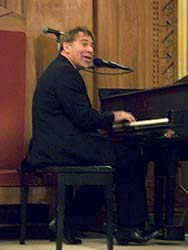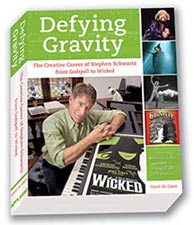Stephen Schwartz - Career Interview 2003
ON THIS PAGE
- An interview with Stephen Schwartz at a Connecticut library during the summer he was finishing Wicked, originally made public as part of the Summer 2003 quarterly update from The Schwartz Scene newsletter.
- More notes from Summer 2003.
From The Schwartz Scene - issue 13
Fall 2003 - Includes Text from an interview with Stephen Schwartz
NOTE FROM THE EDITOR, CAROL DE GIERE:
In lieu of his regular update for The Schwartz Scene newsletter, Stephen Schwartz gave me permission to include part of my transcript of a presentation he gave at a library in Connecticut on July 10th, 2003. The library was hosting a series of events related to THE WIZARD OF OZ and Stephen agreed to comment about WICKED and his work.
 THIS MATERIAL IS COPYRIGHTED. Please do not copy and reprint this without permission.
THIS MATERIAL IS COPYRIGHTED. Please do not copy and reprint this without permission.
Photo: Stephen Schwartz performs.
Excerpts from a Public Interview with Stephen Schwartz - July 2003:
Question: In the 1970's you had three shows running on Broadway at the same time so you were a success at a very early age. What was that like for you?
Stephen Schwartz: The good side is obvious. There was financial security and I was able to move out of New York City to Connecticut. It remains the good side in that I can come across a book like WICKED and decide that I would like to do this as a musical and be able to get the rights, get the backing, and get a show produced. And that's no small feat. That's a huge advantage.
The downside was psychological. I really wasn't prepared for it. It took me a long time to get my equilibrium. That's a very common story. No one wants to hear you complain about being successful (laughter in audience), but it can be difficult to deal with and bewildering. You have no experience of life to deal with people's response to you both pro and con.
Q. (A woman in the audience gives a testimonial about seeing WICKED in San Francisco.) "It was fabulous. It was the best. The song 'For Good' brought tears to my eyes."
Schwartz: Thank you for saying so. We're working hard on it still so I hope we don't ruin it (big laugh from audience). I think it's going to be better. But I'm glad you felt that way.
Q. Could you talk about the show?
Schwartz: The show is based on a novel by a very clever and imaginative writer named Gregory Maguire. He had this brilliant idea to look at the Oz story from the point of view of an iconic villain, the Wicked Witch of the West, and re-imagine the story from her point of view. I thought that was just the best idea I'd ever heard and that it was an extremely musical idea.
I have a really fantastic collaborator named Winnie Holzman who has written the book for it. The way it has developed, as the two of us worked on it, is that it has essentially become about the relationship between the Wicked Witch, whose name is Elphaba, and Glinda the Good Witch, as they begin as reluctant roommates at school. At the end of the show there is a song that they sing to one another called "For Good," and that's the song that's being alluded to....
Q: In that course of development how many songs did you write?
Schwartz: ... I've never actually counted, but I think there are 16 or 17 songs in the show but I've probably written well in excess of 50 songs for it. There's one song (What is This Feeling?) that finally works in the show that the two women sing together. The one that made it into the show is the fifth try at that spot. And then, of course, there's all these songs that you write and you find out that the character you wrote for changes or the situation changes. ...
I'm doing a song now to replace one of the numbers that we felt didn't work well enough in San Francisco ("Which Way's the Party?"). I actually wrote, which is very unusual for me to do, more or less the entire lyric on the plane. So I had this lyric and I didn't have the music. I set it in a certain way and my collaborators are not so sure this is the right way to do it. So I've said, "You know what I'm going to do? ... I'm going to write four different approaches to the music and play them and say 'pick one' and then I'll do it that way, because I can't make up my mind." So I'll let them make up my mind for me.
Q. Where do the other songs go?
Schwartz: Into the "trunk."
Q. (Someone in the audience asks about rewrites.)
Schwartz: We were fortunate in San Francisco in that we were very successful there. I've been in the other situation where you play it in front of an audience and they just are not having it. That's a pretty grim situation. This was the opposite where we had very positive audience response and extremely encouraging critical response. But we were also fortunate in that the critics took us to task in some instances for things we need to do better. That was very useful too in helping to figure out how to improve the show. We've taken a lot of what they said to heart and tried to address it, and I hope we will have done so.
PREPARED TALK AND PERFORMANCE: Stephen Schwartz then discusses versions of Elphaba's "I Want" song
Schwartz: ...If you think about it, pretty much any musical that you can name, certainly any musical since the modern musical became perfected in the later stages of Rogers and Hammerstein, has at least one "I want" song, and if there are two main characters, two "I want" songs. An "I Want" song is one in which the leading character says what he or she is trying to get--what they want. The rest of the show is about watching them trying to get it.
My first notion for Elphaba's "I want" song was that because she was going to become the Wicked Witch of the West, I wanted to write a song called "Making Good," which expresses her ambition to "make good" in both sense of the phrase: that is to do good things, and in doing so, to make "good," in the sense of "succeed." And since she is someone who is born green, and has been for that reason (and for temperamental reasons) a bit of an outcast, her ambition is that if she could only make good, she will finally get the love or acceptance, or whatever you want to call it, that she has been longing for.
[Stephen played and sang part of the piece on the library's piano.]
That was the song for a couple of years. We did a couple of readings with it and it worked pretty well, but I could tell that the song wasn't landing well enough. Jeffrey Katzenberg, with whom I worked at Disney, used to say--if you really came in with a good song, "That's a home run!" Sometimes he'd say, "Well, that's a triple." I could tell this song was a double. Finally I just came in after one of the readings and I told the producer, "I'm going to do that song again. I don't feel it's going to land well enough"....I thought maybe it was a little too mild and a little too ingenuous.
[At this point Schwartz played a newer version of "Making Good" with different music and lyrics.]
That didn't seem to have gotten us any further. Then there was a lot of controversy about which version was better. Some of my collaborators liked one and some liked the other, and I realized I had to rethink the entire thing.
[Schwartz explains that at this point the scenes were rewritten. Something happens so that Elphaba learns someday she may to be able to assist the Wizard of Oz himself. From there he wrote the final version of the song.
He performs "The Wizard and I" for the audience.]
...It took three shots to get there.
END OF PREPARED SEGMENT
Q. An audience member asks about writing for particular cast members and questions whether is it easier to write once you know who the actor will be.
Schwartz: It's so much easier when you know who it is. This song "The Wizard and I" was written for Idina and one of the reasons why I think it works better than the other two songs did is that when I wrote this, I knew it was Idina and I knew how she sang and I knew what her range was. It's really built for Idina. ...
The part of Glinda was changed enormously because it was Kristin. Kristin has been with the show for a long time. She did the second reading of the show. When I first wrote for Glinda all her songs were belt [range] songs. When Kristin came into the show she made these little sounds every now and then. She was like, "I really wish I could just sing high sometimes," and "You know I can sing high."
I didn't know what to do because I didn't know how she could come out and belt sometimes and then all of a sudden sing "Glitter and be Gay." It doesn't make sense. And then one day I had a concept. I said to her, "I think I have an idea of how to do this. I think when you are the Glinda that we all know, you are a soprano, ...But when you are sort of yourself, then you'll sing in belt range." And more or less that has been the concept. But I would never have conceived of doing soprano material for this character if it hadn't been for that Kristin Chenoweth was cast. And now of course I'm thrilled that she made those little sounds. But that's exactly the kind of thing that happens, and over and over again. It really helps to know who you're writing for.
Additional Quote from Schwartz Scene 13, Fall 2003
Editor's note: After completing a revised draft of WICKED with Winnie Holzman following the San Francisco pre-Broadway trial, Stephen Schwartz began working on the music for new radio spots that will begin playing soon. He starts meeting with the New York orchestra next week.
Stephen provided the following message about the changes in the WICKED score since San Francisco. He refers to one of WICKED's characters named Fiyero, who is a prince and the shared love interest of the two witches.
"At this point, there is only one brand new song, a replacement for Fiyero's first number, 'Which Way's the Party?', which is called 'Dancing Through Life.' I have done much trimming and reshaping on other existing songs, and there are several new intro verses to songs which involve reprise material -- this is one of my favorite techniques and makes the score feel more through-composed, and it was something I couldn't do too much of until I knew what the final songs were going to be."
Don't miss....
 Defying Gravity: the Creative Career of Stephen Schwartz, from Godspell to Wicked. Defying Gravity includes many never-before-told stories and over 200 photographs and illustrations. 544 pages. For more information or to order the book online visit DefyingGravityTheBook.com
Defying Gravity: the Creative Career of Stephen Schwartz, from Godspell to Wicked. Defying Gravity includes many never-before-told stories and over 200 photographs and illustrations. 544 pages. For more information or to order the book online visit DefyingGravityTheBook.com
Read more on Stephen Schwartz's Career
- Stephen Schwartz Archive - Wicked years 1 (2001 - 2002)
- Schwartz Scene Archive - Wicked Years 2 (2002 - 2003)
- Schwartz career archives 2004 - 2005
- Schwartz career archives 2006 - 2007
- Schwartz career archives 2008-2010
Subscribe
Subscribe to The Schwartz Scene newsletter
COPYRIGHT
Please DO NOT copy and paste this copyrighted content into your own blogs or websites. You may link to this page but do not copy the content. Thanks. COPYRIGHT reserved by MusicalSchwartz.com
